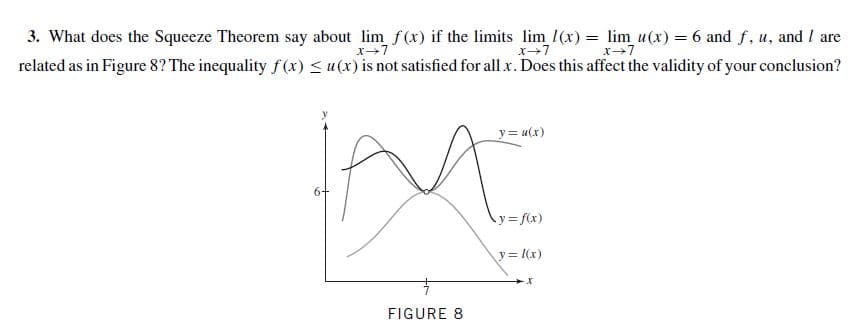3. What does the Squeeze Theorem say about lim f(x) if the limits lim 1(x) = lim u(x) = 6 and f, u, and I are related as in Figure 8? The inequality f(x) < u(x) is not satisfied for all x. Does this affect the validity of your conclusion? x+7 x+7 y = u(x) 6+ y3 f(x) y= l(x) FIGURE 8
3. What does the Squeeze Theorem say about lim f(x) if the limits lim 1(x) = lim u(x) = 6 and f, u, and I are related as in Figure 8? The inequality f(x) < u(x) is not satisfied for all x. Does this affect the validity of your conclusion? x+7 x+7 y = u(x) 6+ y3 f(x) y= l(x) FIGURE 8
Chapter3: Functions
Section3.3: Rates Of Change And Behavior Of Graphs
Problem 2SE: If a functionfis increasing on (a,b) and decreasing on (b,c) , then what can be said about the local...
Related questions
Question

Transcribed Image Text:3. What does the Squeeze Theorem say about lim f(x) if the limits lim 1(x) = lim u(x) = 6 and f, u, and I are
related as in Figure 8? The inequality f(x) < u(x) is not satisfied for all x. Does this affect the validity of your conclusion?
x+7
x+7
y = u(x)
6+
y3 f(x)
y= l(x)
FIGURE 8
Expert Solution
This question has been solved!
Explore an expertly crafted, step-by-step solution for a thorough understanding of key concepts.
This is a popular solution!
Trending now
This is a popular solution!
Step by step
Solved in 3 steps with 2 images

Recommended textbooks for you

